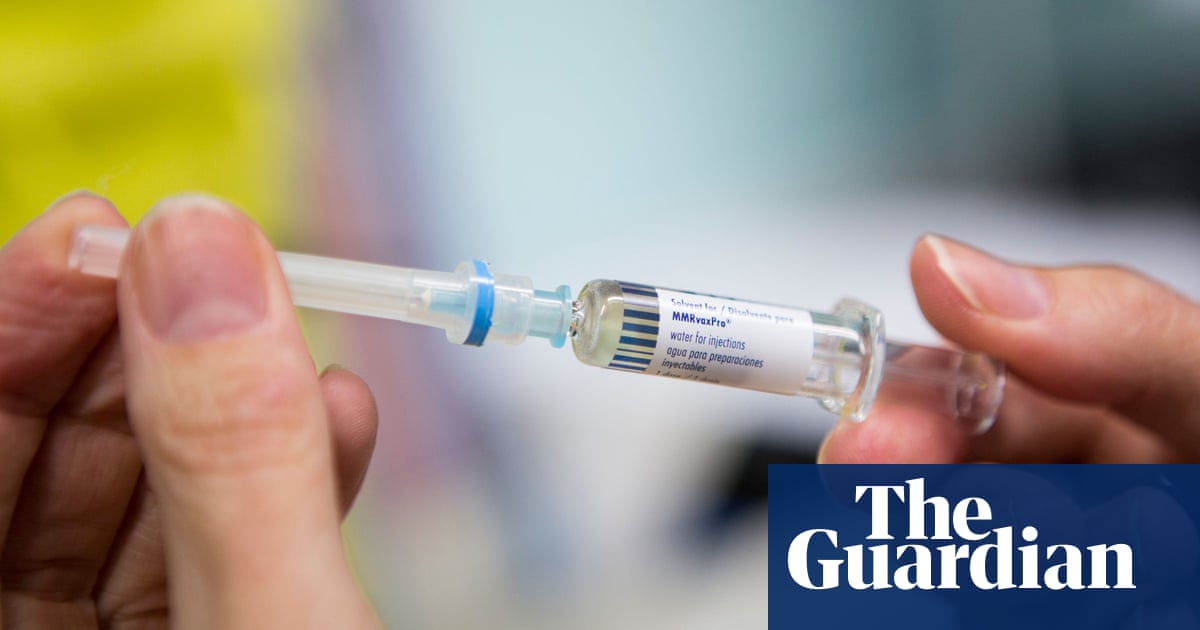
Parents should make sure their children are fully vaccinated against measles before the new school term begins in England, Wales and Northern Ireland, the UK’s health agency has said, amid concerns that pupils mixing at school could fuel a new surge in cases.
According to the UK Health Security Agency (UKHSA), there have been 2,278 laboratory-confirmed measles cases reported in England since the start of 2024, with London and the West Midlands particularly affected. The majority of cases – 62% – have been in children aged 10 years and under.
Measles spreads easily among those who are unvaccinated, and while it often begins with cold-like symptoms followed by a rash, it can lead to severe illness or even death.
The MMR vaccine protects against measles, as well as mumps and rubella, with the first dose offered at one year old and a second at three years and four months as part of the NHS routine childhood immunisation programme.
UKHSA is now stepping up its efforts to boost childhood vaccinations by reminding parents of the dangers of children missing out on protection against measles – as well as against other diseases such as meningitis, polio and whooping cough – through a series of adverts on TV, radio, social media and posters.
Andrew Gwynne, the minister for public health and prevention, said measles could be a serious and sometimes deadly disease.
“Vaccines are our best form of protection, and it is vital that children receive all their vaccinations,” he said. “With the autumn term just around the corner, I am urging all parents to catch up on any missed jabs to keep children safe as they return to the classroom or nursery.”
Since last autumn, England has seen a surge in measles cases, with outbreaks initially occurring in the West Midlands and then in other areas including London. According to UKHSA, the situation has led to the highest level of cases since 2012.
In January UKHSA declared a national incident and warned that uptake of the measles, mumps and rubella (MMR) vaccine was at its lowest level in more than a decade, with population coverage for two doses below the 95% threshold that would prevent measles from spreading.
Efforts to boost uptake have included the national catchup campaign for MMR that was launched in November last year and ramped up in the following months.
According to a new report from UKHSA, such drives have borne fruit: between August 2023 and April 2024 there was a 4.9% increase in uptake of the second jab among black, black British, Caribbean or African children aged between three years, seven months and five years, while more than 13% of previously unvaccinated children aged five years or under received their first MMR jab during the campaign period.
Adam Finn, a professor of paediatrics at the University of Bristol, said there were many reasons why it was important to prevent children from getting measles. “Aside from the fact that it is a very unpleasant illness even without complications, it can leave children with serious or permanent injuries to their lungs, eyes and brains,” he said.
“Children who have had measles are also prone to get other serious infections for months or even years afterwards because the virus damages the immunity they have built up over time. Some children die of measles. All of this is entirely avoidable by ensuring they have received two doses of the safe, effective vaccine that is available free via the NHS.”
Prof Sir Andrew Pollard, of the University of Oxford, agreed. “As a paediatrician I am very alarmed by the ongoing measles outbreak and the real risk that it will get worse this coming autumn as children go back to school next week,” he said.
“Children who are unvaccinated may get seriously ill from it or can spread it to others who are vulnerable, such as children with cancer. Measles is out there in our community and so please ensure your children are up to date with their jabs.”












